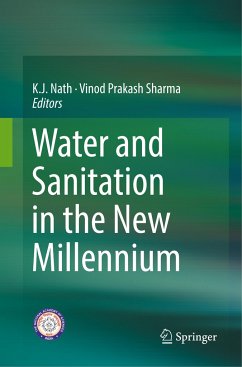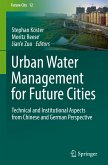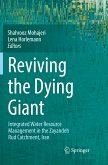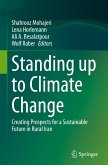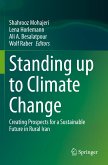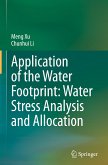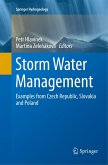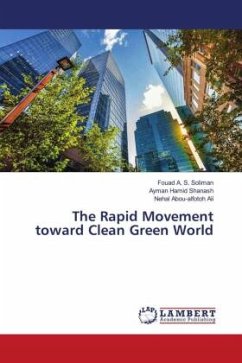Water and Sanitation in the New Millennium
Herausgegeben:Nath, K..J.; Sharma, Vinod Prakash
Water and Sanitation in the New Millennium
Herausgegeben:Nath, K..J.; Sharma, Vinod Prakash
- Broschiertes Buch
- Merkliste
- Auf die Merkliste
- Bewerten Bewerten
- Teilen
- Produkt teilen
- Produkterinnerung
- Produkterinnerung
This contributed volume is about water resources, their variability with prevalent environmental conditions and its sustainable management in India.
Water has always been the life line for survival. An adequate supply of safe drinking water is one of the major pre-requisites for a healthy life. Time and again water has been a means of consolidating power in the human society. In the beginning of the new millennium, water has become a major issue in India. India is known to have the gift of its unique river systems have abundant water resources but ironically India faces severe water crises…mehr
Andere Kunden interessierten sich auch für
![Urban Water Management for Future Cities Urban Water Management for Future Cities]() Urban Water Management for Future Cities116,99 €
Urban Water Management for Future Cities116,99 €![Reviving the Dying Giant Reviving the Dying Giant]() Reviving the Dying Giant116,99 €
Reviving the Dying Giant116,99 €![Standing up to Climate Change Standing up to Climate Change]() Standing up to Climate Change77,99 €
Standing up to Climate Change77,99 €![Standing up to Climate Change Standing up to Climate Change]() Standing up to Climate Change77,99 €
Standing up to Climate Change77,99 €![Application of the Water Footprint: Water Stress Analysis and Allocation Application of the Water Footprint: Water Stress Analysis and Allocation]() Meng XuApplication of the Water Footprint: Water Stress Analysis and Allocation77,99 €
Meng XuApplication of the Water Footprint: Water Stress Analysis and Allocation77,99 €![Storm Water Management Storm Water Management]() Storm Water Management77,99 €
Storm Water Management77,99 €![The Rapid Movement toward Clean Green World The Rapid Movement toward Clean Green World]() Fouad A. S. SolimanThe Rapid Movement toward Clean Green World41,99 €
Fouad A. S. SolimanThe Rapid Movement toward Clean Green World41,99 €-
-
-
This contributed volume is about water resources, their variability with prevalent environmental conditions and its sustainable management in India.
Water has always been the life line for survival. An adequate supply of safe drinking water is one of the major pre-requisites for a healthy life. Time and again water has been a means of consolidating power in the human society. In the beginning of the new millennium, water has become a major issue in India. India is known to have the gift of its unique river systems have abundant water resources but ironically India faces severe water crises and other water management issues on a vast scale.
The water related issues in India varies with both time and space. From crises of potable water, lack of sanitation, water borne diseases, to pesticide and heavy metal contamination, water related predicaments are highly prevalent in India and are more grave in rural set up.
Water has always been the life line for survival. An adequate supply of safe drinking water is one of the major pre-requisites for a healthy life. Time and again water has been a means of consolidating power in the human society. In the beginning of the new millennium, water has become a major issue in India. India is known to have the gift of its unique river systems have abundant water resources but ironically India faces severe water crises and other water management issues on a vast scale.
The water related issues in India varies with both time and space. From crises of potable water, lack of sanitation, water borne diseases, to pesticide and heavy metal contamination, water related predicaments are highly prevalent in India and are more grave in rural set up.
Produktdetails
- Produktdetails
- Verlag: Springer / Springer India / Springer, Berlin
- Artikelnr. des Verlages: 978-81-322-3900-0
- Softcover reprint of the original 1st ed. 2017
- Seitenzahl: 268
- Erscheinungstermin: 22. August 2018
- Englisch
- Abmessung: 235mm x 155mm x 14mm
- Gewicht: 460g
- ISBN-13: 9788132239000
- ISBN-10: 8132239008
- Artikelnr.: 55129378
- Herstellerkennzeichnung Die Herstellerinformationen sind derzeit nicht verfügbar.
- Verlag: Springer / Springer India / Springer, Berlin
- Artikelnr. des Verlages: 978-81-322-3900-0
- Softcover reprint of the original 1st ed. 2017
- Seitenzahl: 268
- Erscheinungstermin: 22. August 2018
- Englisch
- Abmessung: 235mm x 155mm x 14mm
- Gewicht: 460g
- ISBN-13: 9788132239000
- ISBN-10: 8132239008
- Artikelnr.: 55129378
- Herstellerkennzeichnung Die Herstellerinformationen sind derzeit nicht verfügbar.
Dr. Vinod Prakash Sharma, M.Sc. 1960; D.Phil. 1964; D.Sc. 1979 all from Allahabad University, Post Doctoral Research Associate, University of Notre Dame and Purdue University, USA (1964-1968); Pool Officer, Forest Research Institute, Dehradun (1969-1970); Senior Scientist WHO/ICMR Unit on Genetic Control of Mosquitoes, New Delhi (1970-1975), Deputy Director Vector Control Research Centre/Malaria Research Centre (1975-1982); Founder Director National Institute of Malaria Research (1962-1998), and Additional Director General Indian Council of Medical Research (1998). He is FNA, FASc, FNASc, FAMS, FTWAS, and Fellow of several other learned societies. He has specialized in Malaria & Vector Biology. He has 40 years of research and field experience, published c400 scientific papers, book on Anopheles and edited 14 books. Under his leadership NIMR had earned international reputation of excellence in malaria research and control, and established linkages with leading national and international laboratories. Prof. K.J. Nath is widely regarded as one of India's foremost experts on Community Water Supply and Sanitation, Environmental Health and Public Health Engineering. For over four decades, he has played a variety of roles ranging from project engineer, researcher, academician, teacher, consultant, planner and in the process has won nationwide and international acclaim and recognition. As Professor of Environmental Sanitation and Director of the All India Institute of Hygiene & Pubic Health (AIIH&PH), Govt. of India (GOI), he did seminal works on rural and urban water supply and sanitation, urban waste management, air and water pollution, water quality surveillance, environmental epidemiology and impact assessment.
Chapter 1. Overview of the Current Scenario of Community Water Supply and Environmental Sanitation in India (Nath KJ).- Chapter 2. Nirmal Grams: Problems & Prospects (Chandan S).- Chapter 3. Promoting Rural Sanitation - Key Challenges (Sengupta AK).- Chapter 4. Development of Guideline for Implementation of Water Safety Plan for the Rural Water Supply Systems in India (Nath KJ).- Chapter 5. Household Water Treatment: Health Significance and Risk-Based Approaches for Consumer Safety (Ronnie N).- Chapter 6. Geogenic Contamination of Groundwater in India and technological scope for supply of risk free water in the affected areas (Ghosh NC).- Chapter 7. Pesticides, Heavy Metals and Fluoride Contamination of Ground Water Sources: Global and National Perspective (Seth).- Chapter 8. Fluoride and Fluorosis Mitigation: Indian contributions and its impact (Susheela AK).- Chapter 9. Community based approach for mitigation of Arsenic problems: Case studies in West Bengal (Gupta A).- Chapter 10. ACost-Effective Technology for Arsenic Removal: Case Study of Zerovalent Iron based IIT Bombay Arsenic filter in West Bengal (Banerji T).- Chapter 11. Management of Urban Wastewater Infrastructure with Sewer Rehabilitation and Maintenance (Basu NB).- Chapter 12. Urban Solid Waste Management: Key Issues and Challenges (Majumder A).- Chapter 13. Vector Control: Need for an Integrated and Eco-based approach (Sharma VP).- Chapter 14. Role of Fishes in Vector-borne Disease Control in South-East Asia (Yadav RS).- Chapter 15. Health Impact of Bacteriological and Chemical contamination of Drinking water with special reference to Arsenic (Mazumder DNG).- Chapter 16. Impact of Water Contamination and Lack of Sanitation on the Nutritional status of the Community (Chakravarthy I).- Chapter 17. 1. Sustainable Management of Water Resource in India: Feasibility of Linking the Rivers (Rudra K).- Chapter 18. Cost-Benefit Analysis of Hydropower: Case Study of Kotlibhel 1B (Jhunjhunwala).- Chapter 19. A Gandhian Non-Violent Movement For A Non-Violent Culture Of Development (A Report) (Rauta R).
Chapter 1. Overview of the Current Scenario of Community Water Supply and Environmental Sanitation in India (Nath KJ).- Chapter 2. Nirmal Grams: Problems & Prospects (Chandan S).- Chapter 3. Promoting Rural Sanitation - Key Challenges (Sengupta AK).- Chapter 4. Development of Guideline for Implementation of Water Safety Plan for the Rural Water Supply Systems in India (Nath KJ).- Chapter 5. Household Water Treatment: Health Significance and Risk-Based Approaches for Consumer Safety (Ronnie N).- Chapter 6. Geogenic Contamination of Groundwater in India and technological scope for supply of risk free water in the affected areas (Ghosh NC).- Chapter 7. Pesticides, Heavy Metals and Fluoride Contamination of Ground Water Sources: Global and National Perspective (Seth).- Chapter 8. Fluoride and Fluorosis Mitigation: Indian contributions and its impact (Susheela AK).- Chapter 9. Community based approach for mitigation of Arsenic problems: Case studies in West Bengal (Gupta A).- Chapter 10. ACost-Effective Technology for Arsenic Removal: Case Study of Zerovalent Iron based IIT Bombay Arsenic filter in West Bengal (Banerji T).- Chapter 11. Management of Urban Wastewater Infrastructure with Sewer Rehabilitation and Maintenance (Basu NB).- Chapter 12. Urban Solid Waste Management: Key Issues and Challenges (Majumder A).- Chapter 13. Vector Control: Need for an Integrated and Eco-based approach (Sharma VP).- Chapter 14. Role of Fishes in Vector-borne Disease Control in South-East Asia (Yadav RS).- Chapter 15. Health Impact of Bacteriological and Chemical contamination of Drinking water with special reference to Arsenic (Mazumder DNG).- Chapter 16. Impact of Water Contamination and Lack of Sanitation on the Nutritional status of the Community (Chakravarthy I).- Chapter 17. 1. Sustainable Management of Water Resource in India: Feasibility of Linking the Rivers (Rudra K).- Chapter 18. Cost-Benefit Analysis of Hydropower: Case Study of Kotlibhel 1B (Jhunjhunwala).- Chapter 19. A Gandhian Non-Violent Movement For A Non-Violent Culture Of Development (A Report) (Rauta R).

